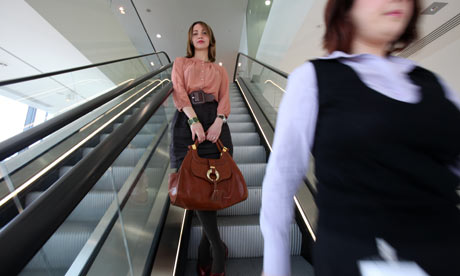
Yesterday began like any other working day. So by 8.35am I was already late and already in a hurry, trotting at my signature ungainly speeded-up clatter along the pavement, my phone clamped beneath shoulder and chin, listening to voicemails as I counted out money in my palm. Every morning as I leave the house, I count my change and work out which combination of newspapers and magazines I can buy at the tube station without having to waste crucial seconds waiting for change or (unthinkable, this) queueing behind another customer who might send my morning into a tailspin by rummaging in their bag for their wallet or engaging the newsagent in conversation.
I was already five minutes late at this stage, having wasted two minutes making arrangements for my son to be taken to his piano lesson, another minute running upstairs when I remembered that the half-price voucher for the StartRite shoes I needed to pick up for my daughter at lunchtime was still on my dressing table, a good 20 seconds working out the answer to an urgent domestic query ("how many days is it now until we go and see Walking with Dinosaurs, Mummy?" Since you ask, it's 137) and then another minute in a second round of kissing.
So there I was, running down the steps into the tube station with coins in one hand, Oyster card in the other, when the last voicemail came through. It was my editor. "Can you write a piece about the Go Slow movement today? You need to stop rushing about. It's the new thing, apparently."
That stopped me in my tracks. The very notion of slowing down is completely alien. And it's not just me. The speed of passengers racing down the stairs either side of me, and their barely concealed huffs as they were forced to deviate centimetres from the fastest route from A to B in order to accommodate the irritating woman standing still, made it pretty clear that frantic has become the norm.
But later this month, the Go Slow movement arrives here from Italy to attempt to change all this. The Slow Down London festival will introduce city dwellers to the rewards of meditation, and the delights of ambling across bridges enjoying the view. This may sound implausible to anyone acquainted with London at rush hour, but I have been attending Milan fashion week for long enough to know that crazy trends from Italy should never be discounted (remember puffball skirts). Slow Food has been a success; if we city-dwellers can slow-cook a shoulder of lamb, perhaps a life lived more gently is just around the corner.
Of course, it's absurd. I write about fashion for a living, so the fabric of society would hardly fall apart were I to get to work 10 minutes later. There is a large dose of nonsensical egotism in our obsession with staying on-schedule, when for the most part life would not be derailed by a five-minute dawdle here or there. But the relentless progress of communications technology has filled every segment of free time: doing several things at once has become second nature. Between the demands of work and family, every chunk of the day is spoken for.
I begin the experiment by standing still on the escalator. This is anathema to me: walking up and down escalators not only saves time but adds two minutes of cardio into your schedule. Standing is boring - the view is not exactly inspiring - and I miss a train. At my breakfast meeting, I keep my phone in my bag, out of view, and force myself not to clock-watch. I take deep, calming breaths as it buzzes angrily against my leg, and try to remember to chew my toast.
The journey back to the office is tough. Until recently I had a phone and a BlackBerry, which meant I could use this time to make phone calls while checking emails. I now have just the one gadget, and am still getting used to what feels like the appalling inefficiency of not being able to email and talk at the same time. The benefits are that I feel the sun on my face and am less prone to near-collisions with other pedestrians. But the backlog of exclamation-mark-tagged emails that await me in the office soon wipes the smile off my face.
Very soon, a day of slow living has passed in a blur. Going slowly has set me back crucial minutes, and all I can think about is how late I am running. I am typing this last paragraph with one eye on the clock in the corner of the screen: my nanny clocks off in 45 minutes, my husband is working late, it takes 40 minutes to get home and I need to buy groceries. There's nothing for it but to finish typing, hit send and run to the bus stop. Slow living is a lovely idea. I just wish there were more hours in the day.

